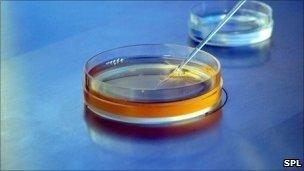Paying for a sibling to save Mark
- Published

Eggs can be selected to be disease free
Treating a child with a genetic disorder is costly for the NHS and heartbreaking for families.
In this week's Scrubbing Up, Professor Simon Fishel, a leading fertility doctor and managing director of the CARE Fertility Group, argues it is right and cost effective for the NHS to pay for IVF to create "saviour siblings".
There are thousands of children and adults across our nation in various stages of sickness and suffering - many terminal - requiring a visit to the hospital for their regular blood transfusion, and many with a short life expectancy.
Some blood disorders, such as beta thalassaemia, Fanconi anaemia, leukaemia and others require blood stem cells (found in bone marrow or cord blood) from a healthy donor who is "tissue matched" to effect a cure.
Tissue typing is a widely used test on the person's DNA to identify antigens, cell markers that distinguish one person's immune system from another's.
Let's look at Mark's life with beta thalassaemia. Aged two-and-a-half his health is failing. Regular blood transfusions and daily cocktails of drugs keep him alive. The drugs will eventually prove toxic and Mark's life expectancy is uncertain.
Mark could be cured with a tissue-matched donor but extensive searches yield nothing. As a last resort his parents' doctor advises trying for another child who may be a tissue match.
Risky odds
This is no burden to the family who want more children.
What the doctor did not say was that the roll of the reproductive dice would mean siblings have only a 25% chance of being an identical match, but any newly-conceived child, even if an identical match, still has a 25% chance of the full-blown disease.
So, the chance of this couple having another child who is both a match and unaffected by the disease is only just under 19% - making the roll of the dice very inefficient. Tragically this happened.
Another pregnancy with the disease resulted for Mark's parents. How many pregnancies or terminations will this family have to go through in an attempt to save Mark's life before they witness his eventual demise and death?
IVF and pre-implantation tissue typing (PTT) allows the selection of embryos in order to bring about the birth of a child who can provide a matched-tissue donation to an existing sibling. It can save Mark.
Some would say this is absolutely positive medicine but question NHS funding of such cases. We would agree that saving Mark's life is vital, indeed a moral imperative if it is within our powers to do so.
We know the NHS is strapped for cash but think about the cost of the existing care, support and medical bills for Mark, for maybe 30 years; and any further costs resulting from other pregnancies that may end in termination, or siblings born with the same disease.
A single IVF attempt costs about £6,000 compared to the millions of pounds the NHS will have to commit to care for Mark.
The extra cost of tissue matching is £1,750 and there are sundry items like blood tests, semen tests and consultations which could amount to about £800.
A pertinent and poignant by-product of the PTT option - a child free of disease and elimination of this condition from this family line - is another long-term saving. And Mark is only one of thousands.
Caring society
In the UK the HFEA (the Human Fertilisation and Embryology Authority) concluded that "sufficient arrangements are in place to protect the welfare of the child in these circumstances".
There are those who believe that by doing this we are on the "slippery slope" towards creating the perfect child.
There is not a shred of evidence in support of this, and especially in a highly-regulated country such as the UK. Indeed, the Human Genetics Commission stated that the slippery slope argument was "misplaced'.
I believe that it is proper use of NHS funds to attempt to cure a sick person by whatever ethically-acceptable medical practice is available to it, providing the cost-benefit ratio to the nation can be substantiated.
This is not IVF for infertile couples, but the only healthcare option open to many hoping to save the life of their child.
Also consider the likely therapeutic and life-saving benefit to the sick sibling, the benefits to the family as a whole, and a new child free of the disease.
The NHS does not provide any national guidance for funding such cases - it depends solely on the individual primary care trust (PCT).
In our experience PCTs accept or reject these patients using different criteria in each case; currently about 50% of our couples achieve PCT funding. It is inequitable, a tragic lottery.
I believe - subject to the current safeguards that already exist - pre-implantation tissue typing should be available throughout our NHS to all who need it; and that this would be entirely appropriate in a modern, civilised and caring society.